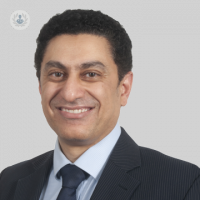Hip arthritis: what is important to know?
Written in association with:Arthritis can be a life-changing condition, especially if not treated early enough. As arthritis affects our joints, the hip is vulnerable to this disease. What should you know if you get arthritis of the hip? Experienced consultant orthopaedic surgeon Mr Moataz El-Husseiny has provided a clear guideline and answered important questions.

How serious is arthritis of the hip?
Hip arthritis is a serious disease. It is a progressive condition that starts with pain and stiffness in the hip that worsens over time. It continues to progress until the joint is destroyed completely. Inside the hip, the cartilage first gets damaged and breaks down, decreasing the joint space.
The lining of the capsule (synovium) becomes inflamed causing more pain, the bone under the cartilage collapses (sclerosis), and new bone is formed inside the joint to increase the surface area (osteophytes). Sacs of fluid develop under the joint surface (sub-chondral cysts) are formed. All these changes are an attempt by the body to decrease the joint reaction forces and movement, therefore increasing joint stiffness and pain on movement.
Genetics, together with other risk factors such as high BMI, play a role in the development of this disease.
What are some signs of needing a hip replacement if I have arthritis?
The signs of needing a hip replacement include recurrent episodes of hip pain or stiffness. These are often intermittent, with having good days and bad days.
Unfortunately, over time this progresses to limping, struggling with day-to-day activities such as walking, shopping, difficulty in standing up, going up and down the stairs, getting in and out of the car, putting on your socks and shoes, and waking up at night with pain.
Are hip replacements always required if a patient has arthritis?
No, hip replacement surgery is not always required if a patient has arthritis. Surgery is only offered once careful history, examination, imaging, and assessing their needs and requirements. Early diagnosis and management can significantly slow progression of the disease and help with dealing with this condition.
Not every patient with hip arthritis needs surgery, as this is reserved for those patients who have complete destruction of their joints, in addition to suffering a substantial functional disability that prevents them from enjoying their normal lifestyles and executing their day-to-day activities.
Careful evaluation is always required to offer the patient the correct management to each in a tailored fashion that fits their needs. It is crucial to optimise each patient adequately prior to hip replacement, to make sure they are fit for the surgery, and implant the best implants for their condition.
What can happen if a person with arthritis doesn’t have hip surgery?
If a person with arthritis doesn’t have surgery, there remains a possibility of progression of the disease resulting in significant leg shortening, inability to walk properly, or in advanced cases, being unable to leave the house or get around the house independently.
What is involved in hip replacement for arthritis and how long does it take to recover?
The procedure involves digital templating, which uses special software that superimposes the planned implants onto the patient’s X-rays. Measurements are done to calculate the best possible combination of implants to restore hip function. At the beginning of the procedure, several checklists are done to ensure the correct implants are present for each specific patient, and the correct surgery and side are being operated on.
The damaged ball and socket parts of the hip are removed and replaced by metal components. These are fitted with mobile parts allowing pain-free movement of the hip. The length of recovery varies from one patient to the other, however, the wound takes two weeks to heal, and usually feels good at six weeks, and great at six months.
If you are experiencing hip pain and would like to schedule a consultation, visit Mr El-Husseiny's Top Doctors profile today.


